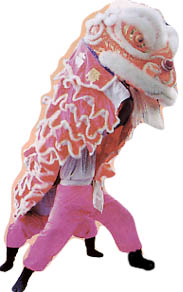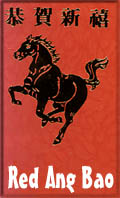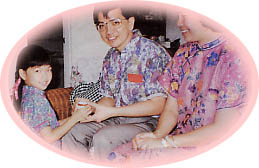|
Chinese New Year
 Chun
jie, or Xing Nian, is known as Chinese New Year. This is the most
important festival in the lunar calendar. It symbolises the beginning of a
new year, and a fresh start in one's life. It also gives fresh hopes for
happiness and prosperity. This is also a time to bring the family together
and set aside or resolve grudges. There will be reunion dinners, visits
among relatives, friends and exchanging of gifts. These serve to remind
the Chinese of the central position the family occupies in the society.
Traditionally, Chun Jie is celebrated over a period of 15 days starting
from the first day of the first month of the lunar calendar. Chun
jie, or Xing Nian, is known as Chinese New Year. This is the most
important festival in the lunar calendar. It symbolises the beginning of a
new year, and a fresh start in one's life. It also gives fresh hopes for
happiness and prosperity. This is also a time to bring the family together
and set aside or resolve grudges. There will be reunion dinners, visits
among relatives, friends and exchanging of gifts. These serve to remind
the Chinese of the central position the family occupies in the society.
Traditionally, Chun Jie is celebrated over a period of 15 days starting
from the first day of the first month of the lunar calendar.
 Origin Origin
Here are just 2 versions to
the origin of Chun Jie, but they are similar in the fact that both
involves the conquest of a legendary best Nian(year).
Version One
One the eve of every new year,
Nian would come out from the mountains and prey on the terrified people. A
wise old man then said it feared loud noise and the colour red. Hence,
before Nian's arrival, people put up red paper on doors and windows and
when Nian comes, all would hit gongs, pots and light fire crackers to
scare it away. According to plan, Nian did not come again.
Version Two
Nian has a very big mouth and
would swallow many people with just a bite. An old man offered to subdue
Nian. He told Nian that he head Nian was very capable, but he was unsure
of Nian being able to swallow other beasts of prey instead of the
people.To prove that he can, Nian swallowed the beasts that harassed
people and their domestic animals. The old man then disappeared riding on
the beast Nian. He was actually an immortal. Nian is gone and other beasts
of prey are also scared into forests. People enjoyed their peaceful life
and they never forgot the old man told them to put up red paper
decorations on windows and doors at each year's end so as to scare Nian
away in case it sneaked back again.
Interesting
Facts
 The
nice parts of Chun Jie only lasts about 2 - 3 days, including the eve.
Days before Chun Jie, families would be busy cleaning up their houses,
sweeping away all ill-fortune to make way for incoming good luck. Doors
and windows would be decorated with paper cuts and couplets with verses
such as "Gong Xi Fa Cai" and "Wan Shi Ru Yi " for good
luck. Some people offer various types of food, fruits and flowers to their
ancestors. Chinese usually have "Fa Gao", a sweet rice pound
cake but but hard. They have it because "Fa" means prosperity
and "Gao" rising high in position. Another cake "Nian Gao"
is important too as it means "Nian Nian Bu Bu Gao Sheng" (having
a yearly rise in position). Firecrackers used to be lit. However, the
Malaysian Government banned firecrackers because it was dangerous and made
a lot of noise. This dampened the celebrative atmosphere a bit but it was
a must action because fires break out and numerous people got hurt or
blinded by the firecrackers. Malaysian families would get together for a
reunion dinner on New Year's Eve. The
nice parts of Chun Jie only lasts about 2 - 3 days, including the eve.
Days before Chun Jie, families would be busy cleaning up their houses,
sweeping away all ill-fortune to make way for incoming good luck. Doors
and windows would be decorated with paper cuts and couplets with verses
such as "Gong Xi Fa Cai" and "Wan Shi Ru Yi " for good
luck. Some people offer various types of food, fruits and flowers to their
ancestors. Chinese usually have "Fa Gao", a sweet rice pound
cake but but hard. They have it because "Fa" means prosperity
and "Gao" rising high in position. Another cake "Nian Gao"
is important too as it means "Nian Nian Bu Bu Gao Sheng" (having
a yearly rise in position). Firecrackers used to be lit. However, the
Malaysian Government banned firecrackers because it was dangerous and made
a lot of noise. This dampened the celebrative atmosphere a bit but it was
a must action because fires break out and numerous people got hurt or
blinded by the firecrackers. Malaysian families would get together for a
reunion dinner on New Year's Eve.
Some might have steamboat
while the more traditional families might eat "jiao zi "
(dumplings). At night, the whole family will stay up late watching TV
programmes, play cards or mahjong or board games etc.. This is called
"shou sui", meaning delaying the aging process for the more
elderly family members. Early next morning, the children will greet their
parents and recieve red packets, which contains money inside. During the
several days following New Year's day, people visit each other and
exchange gifts. Adults are supposed to give red packets to any child or
unmarried person they see.
Rules
 These
rules are a little superstitious but are followed by many Chinese
families. After dinner on the eve, no sweeping out is allowed. If you have
anything to sweep, sweep it in, your luck will not be swept away. If
anyone breaks anything such as a mug, they have to say "Hua Kai Fu
Gui" which means being prosperous after the arrival of flower blooms.
Bad, vulgar topics are discouraged. Debts have to be settled before the
arrival of the new year, or else you will be owing debts for the rest of
the year. These
rules are a little superstitious but are followed by many Chinese
families. After dinner on the eve, no sweeping out is allowed. If you have
anything to sweep, sweep it in, your luck will not be swept away. If
anyone breaks anything such as a mug, they have to say "Hua Kai Fu
Gui" which means being prosperous after the arrival of flower blooms.
Bad, vulgar topics are discouraged. Debts have to be settled before the
arrival of the new year, or else you will be owing debts for the rest of
the year.
|

 Chun
jie, or Xing Nian, is known as Chinese New Year. This is the most
important festival in the lunar calendar. It symbolises the beginning of a
new year, and a fresh start in one's life. It also gives fresh hopes for
happiness and prosperity. This is also a time to bring the family together
and set aside or resolve grudges. There will be reunion dinners, visits
among relatives, friends and exchanging of gifts. These serve to remind
the Chinese of the central position the family occupies in the society.
Traditionally, Chun Jie is celebrated over a period of 15 days starting
from the first day of the first month of the lunar calendar.
Chun
jie, or Xing Nian, is known as Chinese New Year. This is the most
important festival in the lunar calendar. It symbolises the beginning of a
new year, and a fresh start in one's life. It also gives fresh hopes for
happiness and prosperity. This is also a time to bring the family together
and set aside or resolve grudges. There will be reunion dinners, visits
among relatives, friends and exchanging of gifts. These serve to remind
the Chinese of the central position the family occupies in the society.
Traditionally, Chun Jie is celebrated over a period of 15 days starting
from the first day of the first month of the lunar calendar.  Origin
Origin The
nice parts of Chun Jie only lasts about 2 - 3 days, including the eve.
Days before Chun Jie, families would be busy cleaning up their houses,
sweeping away all ill-fortune to make way for incoming good luck. Doors
and windows would be decorated with paper cuts and couplets with verses
such as "Gong Xi Fa Cai" and "Wan Shi Ru Yi " for good
luck. Some people offer various types of food, fruits and flowers to their
ancestors. Chinese usually have "Fa Gao", a sweet rice pound
cake but but hard. They have it because "Fa" means prosperity
and "Gao" rising high in position. Another cake "Nian Gao"
is important too as it means "Nian Nian Bu Bu Gao Sheng" (having
a yearly rise in position). Firecrackers used to be lit. However, the
Malaysian Government banned firecrackers because it was dangerous and made
a lot of noise. This dampened the celebrative atmosphere a bit but it was
a must action because fires break out and numerous people got hurt or
blinded by the firecrackers. Malaysian families would get together for a
reunion dinner on New Year's Eve.
The
nice parts of Chun Jie only lasts about 2 - 3 days, including the eve.
Days before Chun Jie, families would be busy cleaning up their houses,
sweeping away all ill-fortune to make way for incoming good luck. Doors
and windows would be decorated with paper cuts and couplets with verses
such as "Gong Xi Fa Cai" and "Wan Shi Ru Yi " for good
luck. Some people offer various types of food, fruits and flowers to their
ancestors. Chinese usually have "Fa Gao", a sweet rice pound
cake but but hard. They have it because "Fa" means prosperity
and "Gao" rising high in position. Another cake "Nian Gao"
is important too as it means "Nian Nian Bu Bu Gao Sheng" (having
a yearly rise in position). Firecrackers used to be lit. However, the
Malaysian Government banned firecrackers because it was dangerous and made
a lot of noise. This dampened the celebrative atmosphere a bit but it was
a must action because fires break out and numerous people got hurt or
blinded by the firecrackers. Malaysian families would get together for a
reunion dinner on New Year's Eve. These
rules are a little superstitious but are followed by many Chinese
families. After dinner on the eve, no sweeping out is allowed. If you have
anything to sweep, sweep it in, your luck will not be swept away. If
anyone breaks anything such as a mug, they have to say "Hua Kai Fu
Gui" which means being prosperous after the arrival of flower blooms.
Bad, vulgar topics are discouraged. Debts have to be settled before the
arrival of the new year, or else you will be owing debts for the rest of
the year.
These
rules are a little superstitious but are followed by many Chinese
families. After dinner on the eve, no sweeping out is allowed. If you have
anything to sweep, sweep it in, your luck will not be swept away. If
anyone breaks anything such as a mug, they have to say "Hua Kai Fu
Gui" which means being prosperous after the arrival of flower blooms.
Bad, vulgar topics are discouraged. Debts have to be settled before the
arrival of the new year, or else you will be owing debts for the rest of
the year.